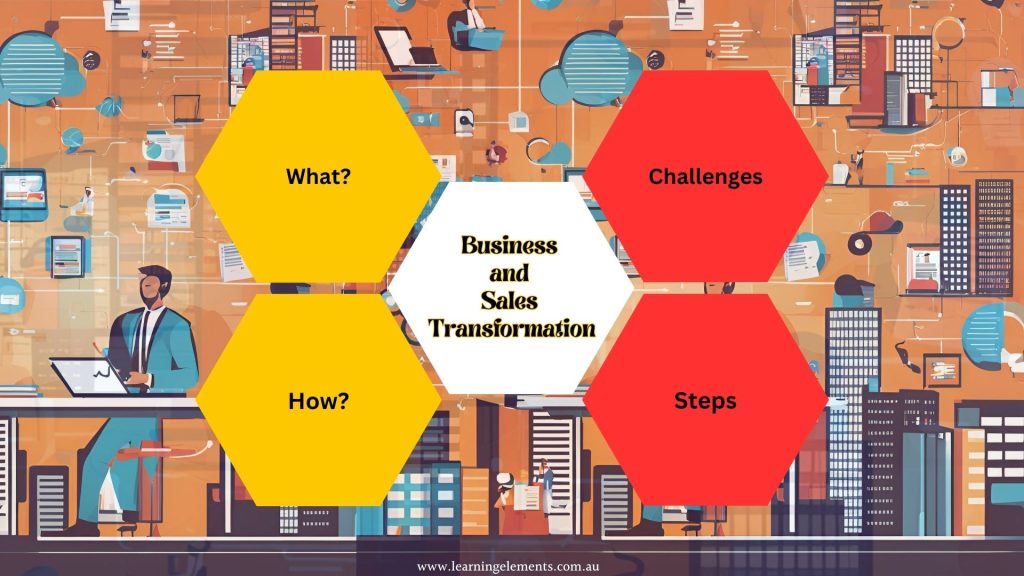The Importance of Business and Sales Transformation: Exploring Why Businesses Need to Adapt and Transform Their Sales Strategies to Stay Competitive in Today’s Market
In today’s competitive market, Business and sales transformation have become essential. But what does this mean? Essentially, it involves adapting and evolving business strategies, particularly in sales, to remain competitive. With rapid technological advancements and shifting customer expectations, businesses must transform their approaches to keep up.
Why is Business and Sales Transformation Significant?
Business transformations aim to enhance overall performance by increasing revenue, reducing operating costs, and improving customer satisfaction and workforce productivity. Sales transformation specifically enhances efficiency by streamlining processes, automating manual tasks, and removing bottlenecks in the sales cycle. It also helps organisations manage data more effectively and track performance metrics, enabling the identification of areas for improvement.
-Adapting to Technological Advancements
Technology is changing how we do business. Companies that fail to adopt new technologies risk falling behind. Business and sales transformation ensures businesses leverage the latest tools, such as AI and machine learning, to streamline processes and enhance efficiency.
-Meeting Customer Expectations
Customers today expect personalised and seamless experiences. They want businesses to understand their needs and provide solutions quickly. Transforming sales strategies to meet these expectations is vital for customer satisfaction and retention.
The Role of Business and Sales Transformation Consulting
Business and sales transformation consulting provides the expertise and guidance needed to navigate these changes effectively. By partnering with experienced consultants, businesses can develop tailored strategies that address their unique challenges and opportunities, ensuring sustained growth and success.
Have questions? Send us a message here and our dedicated team will be available to assist you.

Technological Advancements in Sales
Technological advancements have revolutionised business and sales strategies, particularly through the integration of advanced tools and platforms. This training equips teams with the necessary skills to maximise the potential of new technologies, enhancing their ability to engage customers effectively and close deals more efficiently. By leveraging these advancements, businesses can streamline their sales processes, improve customer satisfaction, and ultimately drive revenue growth. This proactive approach not only keeps businesses competitive but also positions them to lead in their respective markets.
The Impact of CRM Systems
Customer Relationship Management (CRM) systems are crucial in managing customer interactions. They provide valuable insights into customer preferences and behaviour, allowing businesses to customise their sales strategies accordingly. These systems streamline data management, making it easier to track customer interactions and improve overall customer satisfaction. By centralising customer information, CRM systems enable businesses to nurture relationships and enhance customer loyalty. Ultimately, CRM systems contribute to more targeted marketing efforts and improved operational efficiency.
Changing Customer Expectations
Changing Customer Expectations
Demand for Personalised Experiences
Customers no longer accept generic approaches. They want personalised interactions that make them feel valued. This means businesses must transform their sales strategies to focus on individual customer needs.
Importance of Customer Feedback
Customer feedback is a goldmine of information. It helps businesses understand what they are doing right and where they need to improve. Integrating feedback into sales strategies is crucial for ongoing transformation and improvement.
Competitor Analysis
Competitor Analysis
Keeping Up with Industry Leaders
Staying competitive means keeping an eye on what industry leaders are doing. This involves analysing their strategies and understanding what makes them successful. Business and sales transformation often involve adopting best practices from top performers.
Learning from Competitor Strategies
Competitors can provide valuable lessons. By studying their successes and failures, businesses can avoid common pitfalls and implement more effective strategies. Sales process optimisation refines operations based on insights gained from industry leaders. Understanding how competitors achieve success can guide businesses in streamlining their own sales processes, reducing inefficiencies, and enhancing overall productivity. This proactive approach not only fosters continuous improvement but also ensures that businesses remain agile and responsive in a competitive market. By embracing best practices in sales process optimisation, businesses can strategically position themselves to achieve sustainable growth and outperform competitors.

Steps to Implement Business and Sales Transformation
Assessing Current Strategies
Before transforming, businesses need to evaluate their current strategies. This involves identifying strengths and weaknesses and understanding what needs to change.
Setting Clear Objectives
Clear objectives are essential for a successful transformation. Businesses need to define what they want to achieve and set measurable goals to track progress.
Developing a Transformation Plan
Identifying Key Areas for Change
Not all areas of the business may need transformation. Identifying key areas that will benefit most from change is crucial for efficient and effective transformation.
Creating a Roadmap
A detailed roadmap outlining the steps needed for transformation helps keep the process on track. It provides a clear path and ensures all team members are aligned with the goals.
Employee Training and Development
Upskilling Sales Teams
Sales teams need to be equipped with the latest skills and knowledge. Continuous training and development ensure they can effectively implement new strategies and technologies.
Importance of Continuous Learning
The business environment is constantly evolving. Continuous learning helps employees stay up-to-date with industry trends and best practices, ensuring the business remains competitive.
Measuring Success
Key Performance Indicators (KPIs)
KPIs are essential for measuring the success of transformation efforts. They provide valuable insights into performance and highlight areas that need improvement.
Using Analytics for Improvement
Analytics tools help businesses track progress and identify trends. Using these insights, businesses can refine their strategies and ensure they are achieving their transformation goals.
Related Read: BUSINESS AND SALES CONSULTING
Challenges in Business and Sales Transformation
Common Obstacles
Transforming business and sales strategies is not without challenges. Common obstacles include resistance to change, a lack of resources, and inadequate planning.
Overcoming Resistance to Change
Resistance to change is a major hurdle. Effective communication and involving employees in the transformation process can help overcome this resistance.
Conclusion
Business and sales transformation are essential for staying competitive in today’s market. By staying agile and responsive to customer demands, organisations can stay ahead of the curve and maintain a competitive edge. Continuous improvement and transformation are key to staying relevant and meeting the evolving needs of customers. Businesses that prioritise innovation and transformation are better positioned to not only keep up with the competition but also to drive market trends and set new standards.
Adding to the significance of business and sales transformation, digital transformation plays a crucial role in enabling middle-market companies to stay competitive by streamlining processes and enhancing efficiency. Sales digital transformation is particularly important for businesses, as it helps improve sales processes and maintain competitiveness. By continually refining strategies based on market insights and performance data, businesses can not only keep pace with their competitors but also establish themselves as industry leaders, setting the benchmark for excellence and innovation in the marketplace. In today’s fast-paced business environment, adaptability and transformation are essential for sustained success!
Want to know more details? Click the contact button below.
FAQs
What is Business and Sales Transformation?
Business and Sales Transformation involves adapting and evolving business strategies, particularly in sales, to stay competitive in a changing market.
Why is customer feedback important in transformation?
Customer feedback provides valuable insights into what a business is doing right and where it needs to improve, which is crucial for ongoing transformation.
How can businesses measure the success of their transformation efforts?
Businesses can measure success through KPIs and analytics, which provide insights into performance and areas for improvement.

